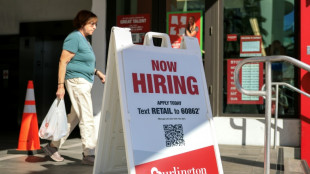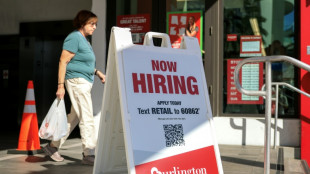-
 Wrexham manager glad Ryan Reynolds on hand for heroics against Forest
Wrexham manager glad Ryan Reynolds on hand for heroics against Forest
-
Arrests reported, cross removed as China crackdown on unofficial churches grows

-
 Wrexham ride 'rollercoaster' to knock Nottingham Forest out of FA Cup
Wrexham ride 'rollercoaster' to knock Nottingham Forest out of FA Cup
-
Mavs' Davis has ligament damage in left hand: report

-
 Mavs' Davis has ligament damaged in left hand: report
Mavs' Davis has ligament damaged in left hand: report
-
Australia declares state of disaster as bushfires rage

-
 Morocco coach Regragui urges calm as hosts reach AFCON last four
Morocco coach Regragui urges calm as hosts reach AFCON last four
-
Koepka applies for PGA Tour reinstatement: reports

-
 Bath and Edinburgh close in on Champions Cup last 16
Bath and Edinburgh close in on Champions Cup last 16
-
Anger over Minneapolis shooting probe fuels protests

-
 Hosts Morocco march on to AFCON semis as Senegal reach last four
Hosts Morocco march on to AFCON semis as Senegal reach last four
-
Frankfurt's Ebnoutalib savours 'dream' debut as Dortmund drop points

-
 Trump pitches Venezuela oil to US majors - and hits skepticism
Trump pitches Venezuela oil to US majors - and hits skepticism
-
Ebnoutalib scores on debut as Dortmund drop points at Frankfurt

-
 Winter Olympic organisers insist ice hockey arena ready despite hole in rink
Winter Olympic organisers insist ice hockey arena ready despite hole in rink
-
Diaz scores again as hosts Morocco beat Cameroon to reach AFCON semis

-
 Minneapolis asks to join probe into woman's killing by immigration officer
Minneapolis asks to join probe into woman's killing by immigration officer
-
MLB hands German outfielder Kepler 80-game doping ban

-
 MLB hands German outfielder Kepler 80-game doing ban
MLB hands German outfielder Kepler 80-game doing ban
-
Brazil's Endrick says Lyon 'ideal club' to boost World Cup ambitions

-
 Brew, smell, and serve: AI steals the show at CES 2026
Brew, smell, and serve: AI steals the show at CES 2026
-
Young 'ecstatic' about NBA move from Hawks to Wizards

-
 Trump meets oil executives, says $100 bn pledged for Venezuela
Trump meets oil executives, says $100 bn pledged for Venezuela
-
Musk's Grok under fire over sexualized images despite new limits

-
 Venezuela says in talks with US to restore diplomatic ties
Venezuela says in talks with US to restore diplomatic ties
-
De Klerk fireworks guide Bengaluru to victory in WPL opener

-
 Uganda's Kiplimo seeks third world cross country crown in a row
Uganda's Kiplimo seeks third world cross country crown in a row
-
Olympic ice hockey arena will be ready for Games: IOC director

-
 Recalled Ndiaye takes Senegal past 10-man Mali into AFCON semis
Recalled Ndiaye takes Senegal past 10-man Mali into AFCON semis
-
'Devastated' Switzerland grieves New Year inferno victims

-
 Man pleads guilty to sending 'abhorrent messages' to England women's footballer Carter
Man pleads guilty to sending 'abhorrent messages' to England women's footballer Carter
-
PGA Tour unveils fall slate with Japan, Mexico, Bermuda stops

-
 'Unhappy' Putin sends message to West with Ukraine strike on EU border
'Unhappy' Putin sends message to West with Ukraine strike on EU border
-
Fletcher defends United academy after Amorim criticism

-
 Stocks shrug off mixed US jobs data to advance
Stocks shrug off mixed US jobs data to advance
-
Kyiv mayor calls for temporary evacuation over heating outages

-
 Families wait in anguish for prisoners' release in Venezuela
Families wait in anguish for prisoners' release in Venezuela
-
Littler signs reported record £20 million darts deal

-
 'Devastated' Switzerland grieves deadly New Year fire
'Devastated' Switzerland grieves deadly New Year fire
-
Syria threatens to bomb Kurdish district in Aleppo as fighters refuse to evacuate

-
 Britain's Princess Catherine 'deeply grateful' after year in cancer remission
Britain's Princess Catherine 'deeply grateful' after year in cancer remission
-
Russia joins Chinese, Iran warships for drills off South Africa

-
 40 white roses: shaken mourners remember Swiss fire victims
40 white roses: shaken mourners remember Swiss fire victims
-
German trial starts of 'White Tiger' online predator

-
 Stocks rise despite mixed US jobs data
Stocks rise despite mixed US jobs data
-
'Palestine 36' director says film is about 'refusal to disappear'

-
 US December hiring misses expectations, capping weak 2025
US December hiring misses expectations, capping weak 2025
-
Switzerland 'devastated' by fire tragedy: president

-
 Semenyo says he wants to 'rewrite history again' after joining Man City
Semenyo says he wants to 'rewrite history again' after joining Man City
-
Rosenior not scared of challenge at 'world class' Chelsea

Boomers: Selfish or Scapegoats?
The debate over whether the Baby Boomer generation—those born between 1946 and 1964—deserves the label of "the most selfish generation in history" has intensified in recent years. Critics argue that Boomers have prioritised their own comfort and prosperity at the expense of future generations, while defenders point to their contributions to social progress and economic growth. This article explores both sides of the argument, drawing on economic, social, and cultural factors to assess the validity of the claim.
A Generation of Prosperity
The post-World War II era was a time of unprecedented economic growth, particularly in Western nations. Boomers grew up in a period of relative stability and prosperity, benefiting from expanding educational opportunities, affordable housing, and a booming job market. This generation was the first to enjoy the fruits of modern consumer culture, with access to new technologies, healthcare advancements, and a welfare state that provided a safety net. However, this prosperity has been criticised as a double-edged sword. While Boomers thrived, they are accused of failing to address long-term challenges such as climate change, economic inequality, and the sustainability of social security systems. The argument goes that their focus on short-term gains has left younger generations—particularly Millennials and Generation Z—facing a future of environmental degradation, housing crises, and precarious employment.
The Burden of Debt
One of the most frequently cited examples of Boomer selfishness is their approach to public debt. Over the past few decades, national debts have soared in many countries, driven by policies that prioritised tax cuts, increased spending on entitlements, and economic stimulus measures. Critics argue that Boomers, who have held political and economic power during this period, have been complicit in passing on this financial burden to future generations. The rising cost of healthcare, pensions, and social security, combined with stagnating wages for younger workers, has fuelled resentment. In some nations, national debt has increased dramatically since the turn of the century, a period during which Boomers dominated leadership positions. This fiscal irresponsibility, some argue, reflects a generational disregard for the future.
The Housing Divide
Housing is another area where Boomers are accused of hoarding wealth. In many developed countries, property prices have skyrocketed, making homeownership increasingly unattainable for younger generations. Boomers, who bought homes when prices were relatively low, have seen their property values soar, creating a wealth gap that is difficult for Millennials and Gen Z to bridge. Over the past few decades, average house prices have risen significantly while wages have remained largely stagnant. This has led to accusations that Boomers have pulled up the ladder behind them, benefiting from policies that favoured property ownership while younger generations are left renting or struggling to save for deposits.
A Legacy of Progress
However, it would be unfair to paint the entire generation with the same brush. Boomers have also been responsible for significant social progress. The civil rights movements of the 1960s and 1970s, which fought for racial equality, gender rights, and LGBTQ+ inclusion, were largely driven by Boomer activists. Their contributions to technology, healthcare, and education have also been transformative. The digital revolution, which laid the foundation for the modern internet and communication technologies, was spearheaded by Boomer innovators. Moreover, many Boomers have engaged in philanthropy and community service, challenging the notion that they are universally selfish.
Generational Perceptions
Another important factor to consider is the role of generational differences in shaping perceptions of selfishness. Younger generations, facing economic uncertainty and environmental crises, may view Boomers' actions through a lens of frustration. However, it is worth noting that every generation has faced criticism from its successors. The Silent Generation, who preceded the Boomers, were often derided for their conformity and conservatism, while Millennials have been labelled as entitled and overly reliant on technology. This cyclical nature of generational criticism suggests that the "selfish" label may be more a reflection of changing societal values than an objective truth.
Structural Influences
Furthermore, the accusation of selfishness overlooks the structural factors that have shaped Boomer behaviour. The economic policies of the late 20th century, particularly the rise of neoliberalism, encouraged individualism and short-term thinking. Boomers, like all generations, were influenced by the prevailing ideologies of their time. The shift towards deregulation, privatisation, and globalisation was not solely a Boomer creation but a broader political and economic trend. To single out Boomers as uniquely selfish ignores the complex interplay of historical forces that have shaped modern society.
Conclusion
In conclusion, while there is evidence to suggest that the Boomer generation has benefited disproportionately from economic and social conditions, labelling them as "the most selfish generation in history" is an oversimplification. Their contributions to social progress and innovation cannot be ignored, nor can the structural factors that have influenced their behaviour. The intergenerational debate is likely to continue, but it is essential to approach it with nuance, recognising that each generation operates within the constraints and opportunities of its time.

Ukrainian President Volodymyr Zelenskyy addresses the Danish Parliament

Переговоры у турецкого диктатора Эрдогана: Россия и Украина пытаются договориться...

Всемирная помощь украинским беженцам от террористической войны России в Украине

Help for refugees arriving in Moldova and Poland from Russian terror in Ukraine

Ukraine war: Russian Terror-Forces enter Slavutych and seize hospital

Russian war crime: 300 dead in Russian terror bombing in Mariupol theatre

Военные преступления России в Украине: половина детей потеряла свои дома!

Ukraine war: NATO agrees on "substantial increase" of forces in Eastern Europe, says Stoltenberg

Ukraine war: US finds Russian troops have committed war crimes

Zelenskyy warns EU: Russia will not stop in Ukraine

Russian war criminal Sergey Lavrov whines as a criminal about his own lies




